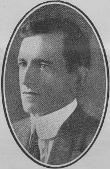Librettist, farmer, businessman, land developer, publicist, publisher, author, aviator.
Clement John De Garis was the eldest son of Mildura (Victoria) businessman Elisha De Garis. He was exempted from school at a very early age in order to help out with his father's struggling business, and by fourteen had saved enough money to pay his own fees for two years at Melbourne's Wesley College. At age seventeen, he returned to his family's business and was instructed to maintain the current sales figures. Within eighteen months, he had tripled them, and he soon afterwards went into business for himself. During a difficult period for the industry in 1919, De Garis took over the role of publicity manager for the Australian Dried Fruit Association, mounting a nationwide marketing campaign along American lines. In this respect, he exploited anything and everything to increase sales, even suggesting the benefits of dried fruits as a means of combating the Spanish influenza epidemic.
De Garis also saw himself as a patron of the arts and, in 1919, launched a Great Australian Novel Competition, the winner of which was awarded the De Garis Prize. At about this time, he also decided to try his hand at writing for the stage. In collaboration with composer Reginald A. A. Stoneham, he wrote the libretto for a musical comedy, F. F .F., which premiered in Adelaide in 1920. Unfortunately, the musical's credibility, and the possibility of a successful Australian tour, was hampered by the public's scepticism over the premiere's timing, which coincided with an advertising campaign for Sunraysed Fruits. Following the Adelaide season, F. F. F. was staged in Perth and Melbourne. A proposed Sydney production never eventuated due to financial difficulties. Despite the failure of the show, it did at least provide two hits songs: 'Murray Moon' and 'Sleepy Seas'.
In his final years years De Garis became an enigmatic figure - being seen as both a man of the people and a fraud. In 1920, for example, he purchased 47,325 acres around Kendenup, Western Australia,
for subdivision. Part of the operation was to irrigate the land, and in order to achieve this he built cottages for the eighty employees required to undertake the work. He also provided the small community with a school,
library, and entertainment centre. That same year De Garis he established the C. J. De Garis Publishing House in Melbourne and bought out
three regional newspapers, the Mildura Cultivator, the Mildura Telegraph and the Merbein Irrigationist. These were then merged into one entity, the Sunraysia Daily. His reputation within the community was furthered even more when he exposed an American fraud who had attempted to swindle the Mildura community.
De Garis's contrary nature began to show itself, however, as his extravagant tastes and reckless nature took control of his better judgment. When his financial situation deteriorated to the point of backruptcy in 1923 he was forced to place the Sunraysia Daily in the hands of a Melbourne-based firm of financiers (the paper was later bought out by the Elliott Provincial Newspaper Group). He was also later charged fraud when his scheme to raise a quarter of a million pounds to re-finance the the Kendenup subdivision failed. Exonerated by a Royal Commission but with his reputation deeply tarnished, De Garis attempted to re-ignite his financial position. However, his mental health had become rather unstable by this time and, after another failure, he faked his death. Apprehended on his way to New Zealand a week later, De Garis was brought home to face a charge of having passed a valueless cheque. He was again acquitted, but by this stage his sense of failure was too much. On 17 August 1926, in a state of depression and delusion, he committed suicide by gassing himself at his Mornington (Victoria) home.
In addition to his musical comedy De Garis authored a number of other works, including several short stories, a war drama titled Ambition Run Mad (1921), and a largely autobiographical novel titled Victories of Failure (1925). The book came out some two years after his company had been forced into liquidation. He also wrote pamphlets on the Sunraysia region and Geelong. His papers are held in the J. S. Battye Library (MN831).
 832191666896292434.jpg
832191666896292434.jpg

